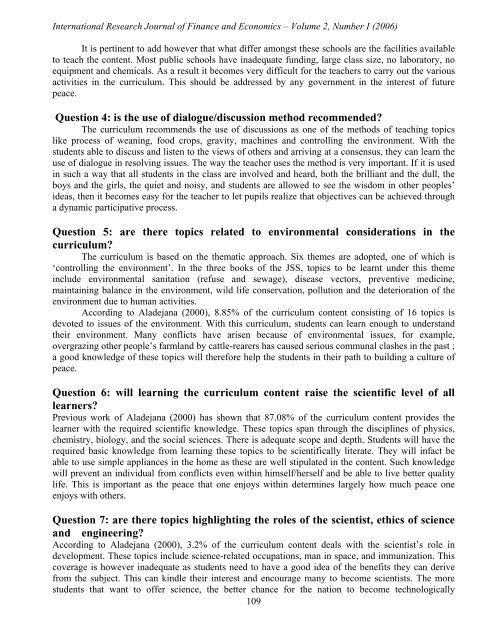EFFECT OF VITAMINS C AND E INTAKE ON BLOOD ... - EuroJournals
EFFECT OF VITAMINS C AND E INTAKE ON BLOOD ... - EuroJournals
EFFECT OF VITAMINS C AND E INTAKE ON BLOOD ... - EuroJournals
Create successful ePaper yourself
Turn your PDF publications into a flip-book with our unique Google optimized e-Paper software.
International Research Journal of Finance and Economics – Volume 2, Number I (2006)<br />
It is pertinent to add however that what differ amongst these schools are the facilities available<br />
to teach the content. Most public schools have inadequate funding, large class size, no laboratory, no<br />
equipment and chemicals. As a result it becomes very difficult for the teachers to carry out the various<br />
activities in the curriculum. This should be addressed by any government in the interest of future<br />
peace.<br />
Question 4: is the use of dialogue/discussion method recommended?<br />
The curriculum recommends the use of discussions as one of the methods of teaching topics<br />
like process of weaning, food crops, gravity, machines and controlling the environment. With the<br />
students able to discuss and listen to the views of others and arriving at a consensus, they can learn the<br />
use of dialogue in resolving issues. The way the teacher uses the method is very important. If it is used<br />
in such a way that all students in the class are involved and heard, both the brilliant and the dull, the<br />
boys and the girls, the quiet and noisy, and students are allowed to see the wisdom in other peoples’<br />
ideas, then it becomes easy for the teacher to let pupils realize that objectives can be achieved through<br />
a dynamic participative process.<br />
Question 5: are there topics related to environmental considerations in the<br />
curriculum?<br />
The curriculum is based on the thematic approach. Six themes are adopted, one of which is<br />
‘controlling the environment’. In the three books of the JSS, topics to be learnt under this theme<br />
include environmental sanitation (refuse and sewage), disease vectors, preventive medicine,<br />
maintaining balance in the environment, wild life conservation, pollution and the deterioration of the<br />
environment due to human activities.<br />
According to Aladejana (2000), 8.85% of the curriculum content consisting of 16 topics is<br />
devoted to issues of the environment. With this curriculum, students can learn enough to understand<br />
their environment. Many conflicts have arisen because of environmental issues, for example,<br />
overgrazing other people’s farmland by cattle-rearers has caused serious communal clashes in the past ;<br />
a good knowledge of these topics will therefore help the students in their path to building a culture of<br />
peace.<br />
Question 6: will learning the curriculum content raise the scientific level of all<br />
learners?<br />
Previous work of Aladejana (2000) has shown that 87.08% of the curriculum content provides the<br />
learner with the required scientific knowledge. These topics span through the disciplines of physics,<br />
chemistry, biology, and the social sciences. There is adequate scope and depth. Students will have the<br />
required basic knowledge from learning these topics to be scientifically literate. They will infact be<br />
able to use simple appliances in the home as these are well stipulated in the content. Such knowledge<br />
will prevent an individual from conflicts even within himself/herself and be able to live better quality<br />
life. This is important as the peace that one enjoys within determines largely how much peace one<br />
enjoys with others.<br />
Question 7: are there topics highlighting the roles of the scientist, ethics of science<br />
and engineering?<br />
According to Aladejana (2000), 3.2% of the curriculum content deals with the scientist’s role in<br />
development. These topics include science-related occupations, man in space, and immunization. This<br />
coverage is however inadequate as students need to have a good idea of the benefits they can derive<br />
from the subject. This can kindle their interest and encourage many to become scientists. The more<br />
students that want to offer science, the better chance for the nation to become technologically<br />
109
















